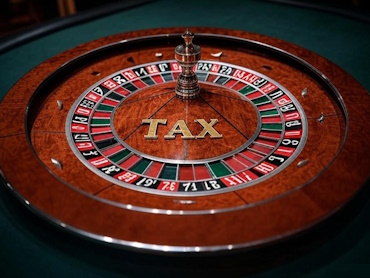Are Roulette Winnings Taxable?
Paying Roulette Tax in the UK, US, Canada, Ireland and NZ.
Do you Have to Pay Tax on Roulette Wins?

Do you have to pay tax on winnings from a roulette table? First off, we’ll just state that you should always seek professional tax advice on these kinds of questions, but we hope to clarify the subject for you and point you in the right direction for further investigation.
Whether or not you need to pay tax on casino winnings including roulette play will depend on the country, of course.
Below we cover some of the main English speaking countries with regards to their position on this
United Kingdom

In the United Kingdom, gambling winnings, including those from roulette, are not subject to taxation.
This exemption applies regardless of whether your winnings are from land-based casinos like the Hippodrome in London or Mayfair clubs, or from online gambling platforms.
Consequently, you are not required to declare these winnings to HM Revenue and Customs (HMRC).
THE UK RULES
Since gambling winnings are tax-free, there is no need to account for your profits or losses, nor to offset losses against winnings for tax purposes. The UK government does not consider gambling a trade or profession; therefore, even professional gamblers are not taxed on their winnings.
It’s important to note that while your gambling winnings are tax-free, any interest earned from these winnings, if deposited in a bank account, may be subject to income tax. Additionally, if you gift a portion of your winnings or include them in your estate, other taxes such as Gift Tax or Inheritance Tax may apply.
For authoritative information, you can consult HMRC’s guidelines on gambling duties, which provide detailed insights into how gambling is taxed in the UK. While these guidelines primarily cover the responsibilities of gambling operators, they also clarify that individual gamblers are not liable for tax on their winnings.
In summary, your roulette winnings in the UK are tax-free, and you are not obligated to declare them to HMRC. This policy applies uniformly to all forms of gambling, whether conducted in-person or online.
United States

What about in the US?
In the United States, gambling winnings are taxable for both U.S. residents and non-residents, such as a UK residents visiting Atlantic City.
Here’s a breakdown of the tax situation. Again, consult a tax expert to make sure that you understand the current rule:
- For U.S. Residents:
Taxability of Winnings:
All gambling winnings, including those from roulette, are subject to federal income tax. This includes winnings from land-based casinos (like the Bellagio or Luxor in Las Vegas) and online gambling platforms.
Winnings must be reported as income on Form 1040 (U.S. Individual Income Tax Return).
Reporting Requirements:
Casinos may issue Form W-2G (Certain Gambling Winnings) if your winnings meet specific thresholds:
$1,200 or more from a slot machine or bingo.
$1,500 or more from keno.
$5,000 or more from a poker tournament.
$600 or more and at least 300 times the amount of your bet for other gambling activities, including roulette.
Even if you don’t receive a W-2G, you are required to report all winnings.
Deducting Losses:
Gambling losses can be deducted, but only up to the amount of gambling winnings. Losses must be itemized on Schedule A (Itemized Deductions) and supported with records (e.g., receipts, tickets, or logs).
Losses from one day cannot offset winnings on another; instead, deductions are limited to the total winnings for the tax year.
- For UK Residents Visiting the U.S. (Non-Residents):
Taxability of Winnings:
Non-residents, including UK tourists, are subject to a 30% federal withholding tax on gambling winnings unless a tax treaty applies.
The U.S. and the UK have a tax treaty that allows UK residents to avoid this withholding tax for gambling winnings from certain games, but table games like roulette may not always be covered.
Filing Requirements:
If tax is withheld, UK residents can file a U.S. tax return (Form 1040-NR) to claim a refund or report gambling income and deductions, provided they meet the necessary criteria.
Deducting Losses:
Non-residents generally cannot deduct gambling losses unless they are residents of a country with a favorable tax treaty allowing such deductions (e.g., Canada but not the UK).
Tax Differences Between U.S. and UK Residents
| Aspect | U.S. Resident | UK Resident (Non-Resident) |
|---|---|---|
| Tax on Winnings | Yes, reportable on Form 1040. | Yes, 30% withholding unless treaty applies. |
| Reporting Requirements | All winnings, regardless of amount. | Thresholds for withholding depend on treaty. |
| Loss Deduction Allowed? | Yes, up to the amount of winnings. | No (unless specified by treaty). |
Additional Considerations:
- Online Gambling: Winnings from online platforms are treated similarly to those from land-based casinos. Reporting is mandatory, regardless of the location of the platform.
- State Taxes: Some states impose additional taxes on gambling winnings, so local laws should also be considered.
Further Reading:
- IRS Publication 525: Taxable and Nontaxable Income
- IRS Form W-2G Information: Gambling Winnings and Losses
- U.S.-UK Tax Treaty Details: IRS International Tax Treaties
Canada

In Canada, gambling winnings, including those from games like roulette, are as a rule not considered taxable income for casual or recreational players.
The Canada Revenue Agency (CRA) views such winnings as windfalls, which are non-taxable.
Professional Gamblers:
Much like new Zealand, the tax rules change if you are considered a professional gambler. If gambling activities are conducted in a “sufficiently business-like manner”, with the intention of earning a profit and relying on skill rather than chance, the CRA may categorise you as operating a gambling business. In such cases, gambling income becomes taxable, and the individual is required to report winnings as business income on their tax return.
Provincial Differences:
While federal tax laws apply uniformly across Canada, provincial tax rates can vary, affecting the overall tax payable by professional gamblers. For instance:
Ontario: Provincial tax rates range from 5.05% to 13.16%, depending on income levels.
Quebec: Provincial tax rates can be up to 14% on the first $49,275 of income, with higher rates for additional income.
These rates apply to taxable income, including gambling income for those classified as professional gamblers.
Casinos on Reservations:
Casinos located on Indigenous reservations operate under agreements between Indigenous groups and provincial governments. However, the tax treatment of gambling winnings for patrons remains consistent nationwide. Casual gamblers are not taxed on their winnings, regardless of the casino’s location. Professional gamblers, however, are required to report their income and pay applicable taxes, irrespective of where the gambling takes place.
Key Considerations:
Interest Income: While gambling winnings are in the main non-taxable for casual players, any interest earned from these winnings (e.g., if deposited in a bank account) is considered taxable income and must be reported.
Record-Keeping:
It’s advisable for individuals engaged in gambling activities to maintain records. This is particularly important for those who may be considered professional gamblers, as accurate records are essential for tax reporting and substantiating income and expenses.
So, for most players in Canada, roulette winnings are not taxable, and there is no requirement to report them as income. However, if gambling activities are conducted in a “professional and business-like manner”, the income becomes taxable, and the individual must comply with federal and provincial tax obligations. Provincial tax rates vary, but the fundamental tax treatment of gambling income remains consistent across the country.
Ireland

In the Republic of Ireland, gambling winnings, such as those from roulette, are not subject to personal taxation.
This exemption applies to all forms of gambling, such as casino games, sports betting, lotteries, and online gambling.
Players are not required to declare their gambling winnings to the Irish Revenue Commissioners.
Instead of taxing individuals, Ireland taxes gambling operators. For instance, a betting duty is levied on bookmakers.
This means that while operators are taxed on their revenue, players retain their winnings in full without any tax deductions.
It’s important to note that while gambling winnings are tax-free for recreational players, the situation might differ for individuals whose primary source of income is gambling. In such cases, the Revenue Commissioners may assess whether the gambling activity constitutes a trade, which could have tax implications. However, this is determined on a case-by-case basis, and there is no clear-cut rule defining professional gambling for tax purposes in Ireland.
In summary, for most individuals in Ireland, roulette winnings and other gambling proceeds are tax-free, and there is no obligation to report them to tax authorities. The taxation responsibility lies with the gambling operators rather than the players.
New Zealand

In New Zealand, gambling winnings, including those from roulette, are generally not taxed for individuals.
The Inland Revenue Department (IRD) considers gambling to be a recreational activity for most players, meaning their winnings are categorised as “windfalls” rather than taxable income.
However, if gambling becomes a professional activity, the situation changes. If a person consistently gambles with the intention to make a profit, their activities may be classified as a business. In such cases, their winnings are considered taxable income, and they must file returns with the IRD. Factors that may indicate professional gambling include:
- Regular and systematic gambling activity.
- Use of a strategies.
- A substantial reliance on gambling income to meet living expenses.
Note that while individual players are usually exempt from taxes on their winnings, operators of gambling platforms pay tax on their operations. These taxes are designed to ensure the industry contributes to the national economy and adheres to strict regulatory standards.
In summary, for most individuals in New Zealand, roulette winnings and other gambling proceeds are tax-free, and there is no obligation to report them to tax authorities. However, if gambling constitutes a significant portion of your income or is conducted in a professional manner, it may be subject to taxation. Consult with a tax professional or the IRD to understand your specific situation.


